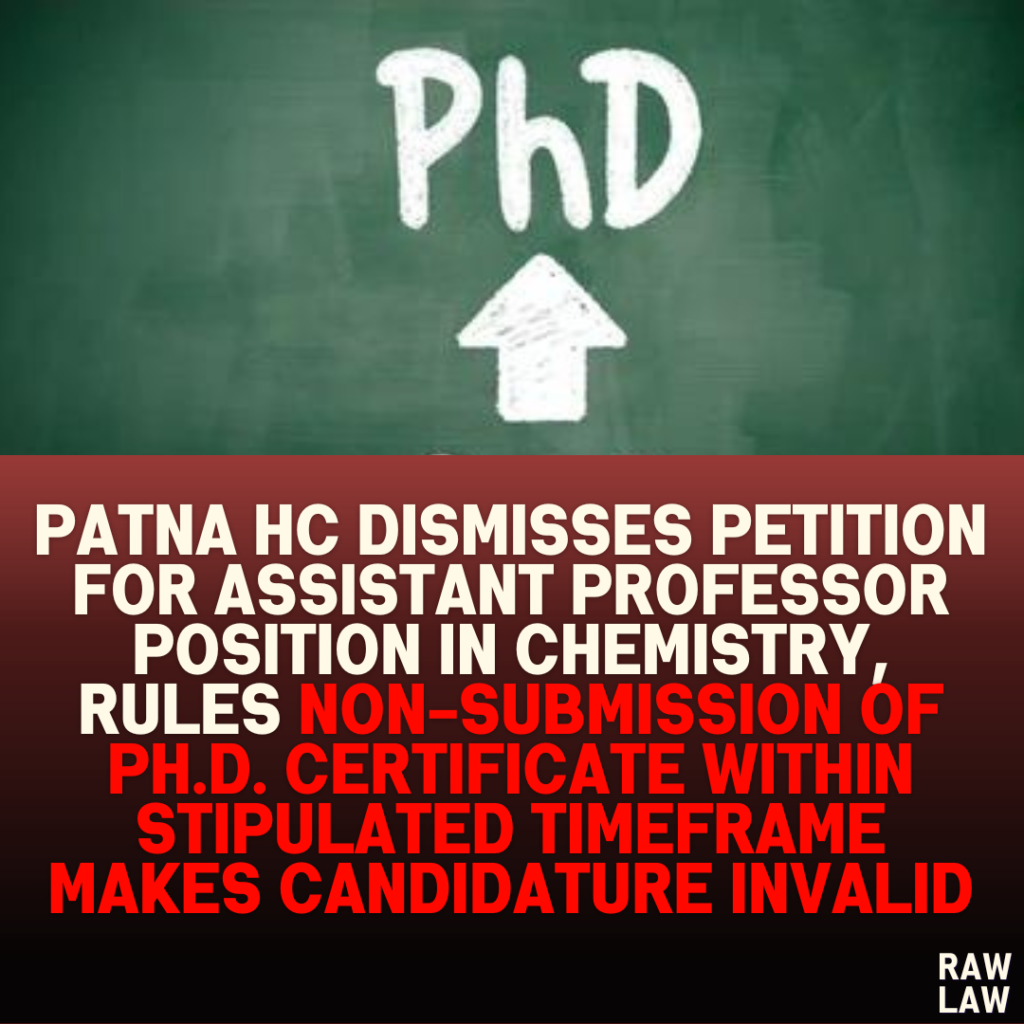Court’s Decision:
The Patna High Court dismissed the writ petition, holding that the petitioner’s failure to submit the required Ph.D. five-point certificate within the prescribed time frame as per the advertisement made her ineligible for consideration. The Court emphasized that the selection process must strictly follow the terms set out in the advertisement, and no relaxation in this regard could be granted without specific provisions.
Facts:
The petitioner applied for the position of Assistant Professor in Chemistry, advertised by the Bihar State University Service Commission on September 21, 2020. The advertisement required submission of a Ph.D. certificate containing five specific criteria by the last date of submission, which was initially November 2, 2020, and extended to December 30, 2020. The petitioner did not submit the required certificate within this timeframe but did so on May 26, 2024, well after the selection process was concluded.
Issues:
The core issue before the Court was whether the petitioner could be allowed to submit the Ph.D. certificate after the stipulated deadline and still be considered eligible for the selection process.
Petitioner’s Arguments:
The petitioner contended that while she failed to submit the five-point Ph.D. certificate within the deadline, she still possessed the required Ph.D. degree. It was argued that acquiring eligibility and certifying eligibility are separate matters, and the Commission should not have rejected her application for the delay in document submission. The petitioner relied on judgments from the Supreme Court in Dolly Chhanda v. Chairman, JEE (2005) and Charles K. Skaria v. C. Mathew (Dr) (1980) to support her claim.
Respondent’s Arguments:
The respondents argued that the selection process must adhere to the advertisement’s specified requirements, including deadlines. The petitioner’s failure to submit the certificate on time disqualified her, as no relaxation of the stipulated procedure was allowed under the recruitment rules. The respondents further supported their argument by citing relevant legal precedents, including Braj Kishore Prasad vs. State of Bihar (1998) and Bedanga Talukdar v. Saifudaullah Khan (2011).
Analysis of the Law:
The Court noted that the five-point Ph.D. certificate was a mandatory requirement under the advertisement and had to be submitted before the last date specified. The law requires strict adherence to the terms and conditions of the advertisement, and unless explicitly mentioned, no provision exists for relaxing such conditions post the deadline. The petitioner’s failure to submit the certificate on time meant that her application did not comply with the eligibility criteria.
Precedent Analysis:
The Court relied on the Full Bench decision in Braj Kishore Prasad vs. State of Bihar (1998) and the Supreme Court decision in Bedanga Talukdar v. Saifudaullah Khan (2011). Both cases affirmed that selection processes for public employment must follow the terms of the advertisement and that any relaxation of deadlines or conditions must be specifically provided in the rules or the advertisement.
Court’s Reasoning:
The Court reasoned that since the petitioner did not submit her Ph.D. certificate within the stipulated timeframe, and there was no provision for extending the deadline or relaxing the conditions in the recruitment rules or the advertisement, her candidature could not be accepted. The Court observed that allowing such a relaxation would violate the principles of fairness and equality in the selection process.
Conclusion:
The writ petition was dismissed on the grounds that the petitioner’s failure to comply with the terms of the advertisement disqualified her from being considered for the position of Assistant Professor. The Court ruled that the selection process must be conducted in strict adherence to the rules and schedule outlined in the advertisement, without any relaxation unless explicitly provided.
Implications:
This judgment underscores the importance of adhering to the deadlines and requirements specified in public employment advertisements. It reinforces that any deviations or relaxations must be explicitly stated in the relevant rules or the advertisement itself, and that failure to comply with such terms will result in disqualification from the selection process.
